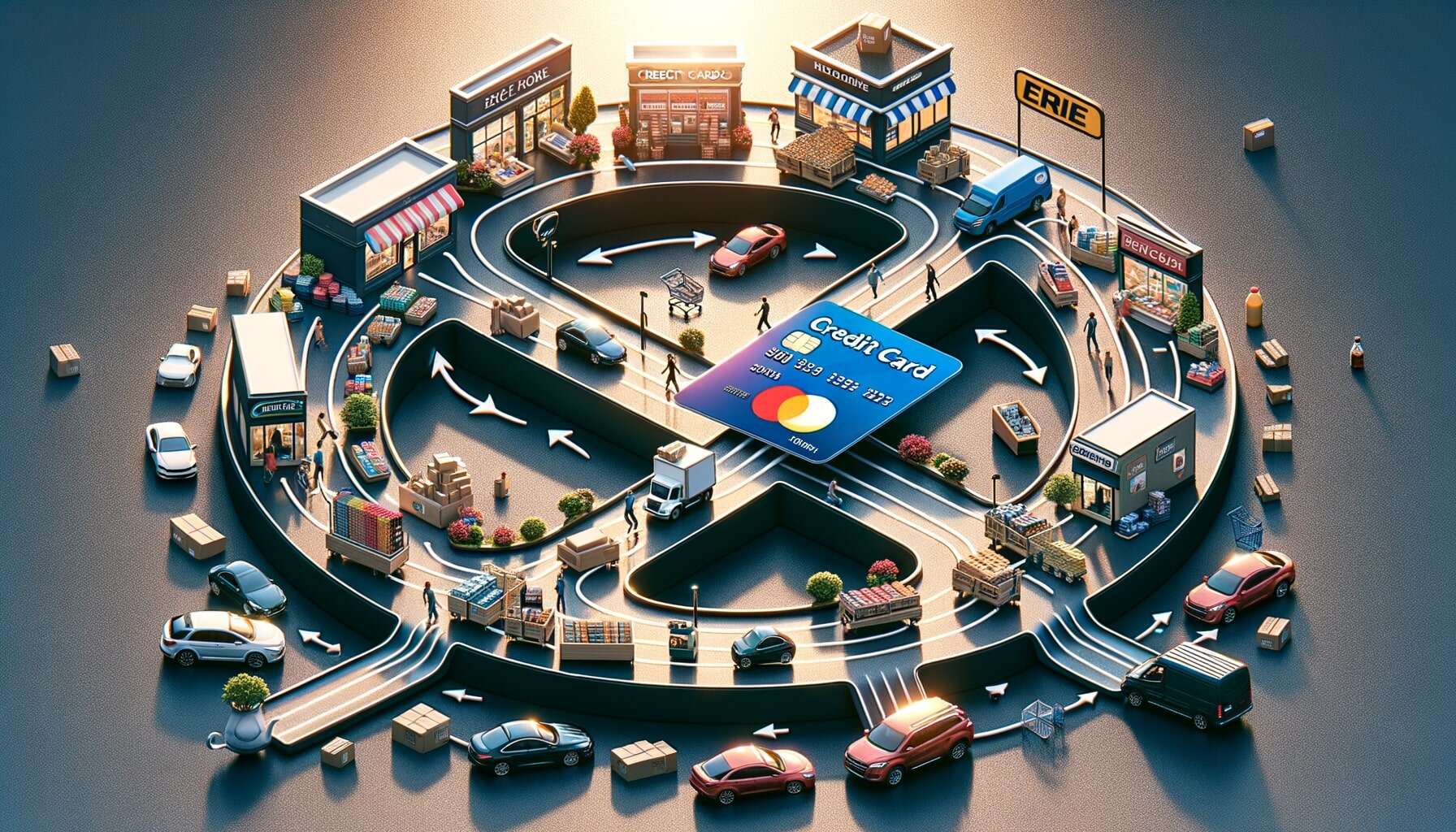
By Karen Smith June 10, 2025
As a local retailer in Erie, understanding how credit card processing works is essential for the success of your business. In today’s digital age, consumers rely heavily on credit and debit cards for their purchases, making it crucial for retailers to have a reliable and efficient payment processing system in place.
This comprehensive guide will walk you through the basics of credit card processing, the different types of systems available, how to choose the right processor for your business, setting up credit card processing for your retail store, accepting different types of credit cards, understanding the fees associated with processing, ensuring security, and troubleshooting common issues.
The Basics of Credit Card Processing
Credit card processing is the process of electronically verifying and authorizing a credit card transaction between a customer and a merchant. When a customer makes a purchase using a credit card, the merchant’s payment processor communicates with the customer’s issuing bank to verify the transaction and ensure that the customer has sufficient funds to cover the purchase. Once the transaction is approved, the funds are transferred from the customer’s account to the merchant’s account.
The basic steps involved in credit card processing include:
1. Authorization: The customer swipes or inserts their credit card at the point of sale (POS) terminal, and the transaction details are sent to the payment processor.
2. Verification: The payment processor communicates with the customer’s issuing bank to verify the transaction details and check for available funds.
3. Approval: If the transaction is approved, the funds are transferred from the customer’s account to the merchant’s account.
4. Settlement: The funds are deposited into the merchant’s bank account within a few business days.
Types of Credit Card Processing Systems
There are several types of credit card processing systems available for local retailers in Erie, each with its own set of features and benefits. The most common types of credit card processing systems include:
1. Traditional POS Systems: These systems are typically used by brick-and-mortar retailers and include a physical terminal where customers can swipe or insert their credit cards. Traditional POS systems are reliable and secure but may require upfront costs for hardware and software.
2. Mobile Payment Solutions: Mobile payment solutions allow retailers to accept credit card payments using a smartphone or tablet. These systems are convenient and cost-effective, making them ideal for small businesses and pop-up shops.
3. Online Payment Gateways: Online payment gateways are used for e-commerce businesses that sell products or services online. These systems securely process credit card transactions over the internet and are essential for businesses with an online presence.
4. Virtual Terminals: Virtual terminals allow retailers to process credit card payments manually, without the need for a physical terminal. This is useful for businesses that accept payments over the phone or by mail.
Choosing the Right Credit Card Processor for Your Business

When choosing a credit card processor for your retail store in Erie, it’s essential to consider several factors, including:
1. Cost: Compare the fees and rates of different processors to find one that offers competitive pricing for your business size and transaction volume.
2. Features: Look for processors that offer features such as fraud protection, reporting tools, and integration with your POS system.
3. Customer Support: Choose a processor that provides reliable customer support to help you troubleshoot issues and answer any questions you may have.
4. Security: Ensure that the processor complies with industry standards for data security to protect your customers’ sensitive information.
5. Compatibility: Make sure that the processor is compatible with your POS system and other software tools you use in your business.
Setting Up Credit Card Processing for Your Retail Store
Setting up credit card processing for your retail store in Erie is a straightforward process that involves the following steps:
1. Choose a Processor: Research and compare different credit card processors to find one that meets your business needs.
2. Apply for an Account: Fill out an application with the processor of your choice and provide any required documentation.
3. Set Up Hardware: Install any necessary hardware, such as a POS terminal or card reader, and connect it to your payment processor.
4. Test Transactions: Conduct test transactions to ensure that your credit card processing system is working correctly.
5. Train Staff: Train your staff on how to use the credit card processing system and handle transactions securely.
Accepting Different Types of Credit Cards
As a local retailer in Erie, it’s essential to accept a wide range of credit cards to accommodate your customers’ preferences. The most common types of credit cards include:
1. Visa: Visa is one of the most widely accepted credit card brands worldwide, making it essential for retailers to accept Visa payments.
2. Mastercard: Mastercard is another popular credit card brand that is widely accepted by retailers and consumers.
3. American Express: American Express cards are known for their rewards and benefits, making them popular among affluent consumers.
4. Discover: Discover is a lesser-known credit card brand but is still widely accepted by many retailers.
By accepting a variety of credit cards, you can attract more customers and increase your sales potential.
Understanding the Fees Associated with Credit Card Processing
Credit card processing fees can vary depending on the processor you choose and the type of transactions you process. The most common types of fees associated with credit card processing include:
1. Interchange Fees: Interchange fees are charged by the card networks (Visa, Mastercard, etc.) and are a percentage of the transaction amount.
2. Processor Fees: Processor fees are charged by the payment processor for processing transactions and may include a flat fee per transaction or a percentage of the transaction amount.
3. Monthly Fees: Some processors charge monthly fees for using their services, which can include statement fees, PCI compliance fees, and other administrative costs.
4. Chargeback Fees: Chargeback fees are charged when a customer disputes a transaction, and the funds are reversed from the merchant’s account.
It’s essential to understand the fees associated with credit card processing and factor them into your pricing strategy to ensure profitability.
Ensuring Security in Credit Card Processing
Security is a top priority for local retailers in Erie when it comes to credit card processing. To ensure the security of your customers’ sensitive information, follow these best practices:
1. Use EMV Technology: EMV chip technology provides an added layer of security by encrypting transaction data and reducing the risk of fraud.
2. Secure Your POS System: Keep your POS system up to date with the latest security patches and software updates to protect against cyber threats.
3. Encrypt Data: Encrypt customer data during transmission and storage to prevent unauthorized access.
4. Comply with PCI Standards: Ensure that your business complies with Payment Card Industry Data Security Standard (PCI DSS) requirements to protect cardholder data.
By implementing these security measures, you can build trust with your customers and protect your business from potential data breaches.
Troubleshooting Common Issues in Credit Card Processing

Despite your best efforts to set up a reliable credit card processing system, you may encounter common issues that can disrupt your business operations. Some of the most common issues in credit card processing include:
1. Declined Transactions: If a transaction is declined, it could be due to insufficient funds, an expired card, or a technical issue with the payment processor.
2. Slow Processing Times: Slow processing times can frustrate customers and lead to lost sales. Ensure that your internet connection is stable and that your POS system is functioning correctly.
3. Chargebacks: Chargebacks occur when a customer disputes a transaction, leading to a reversal of funds. To prevent chargebacks, provide excellent customer service and resolve any issues promptly.
By addressing these common issues proactively and working with your payment processor to find solutions, you can minimize disruptions to your business and provide a seamless payment experience for your customers.
Frequently Asked Questions about Credit Card Processing for Local Retailers in Erie
Q1. What is the difference between a payment gateway and a payment processor?
Answer: A payment gateway is a secure portal that connects your website to the payment processor, while a payment processor is a service provider that facilitates credit card transactions.
Q2. How long does it take for funds to be deposited into my bank account?
Answer: Funds from credit card transactions are typically deposited into your bank account within 1-3 business days, depending on your processor’s policies.
Q3. Can I accept contactless payments with my credit card processing system?
Answer: Yes, many credit card processors offer contactless payment options, such as Apple Pay and Google Pay, to accommodate customers who prefer touchless transactions.
Q4. What should I do if I suspect fraudulent activity on my account?
Answer: If you suspect fraudulent activity on your account, contact your payment processor immediately to report the issue and take steps to secure your account.
Q5. Are there any hidden fees associated with credit card processing?
Answer: It’s essential to review your processor’s terms and conditions carefully to understand any potential hidden fees, such as chargeback fees or PCI compliance fees.
Conclusion
Credit card processing is an essential aspect of running a successful retail business in Erie. By understanding the basics of credit card processing, choosing the right processor for your business, setting up a reliable payment system, accepting different types of credit cards, understanding fees, ensuring security, and troubleshooting common issues, you can provide a seamless payment experience for your customers and drive sales growth.
By following the guidelines outlined in this comprehensive guide, you can navigate the world of credit card processing with confidence and set your retail store up for success in the digital age.